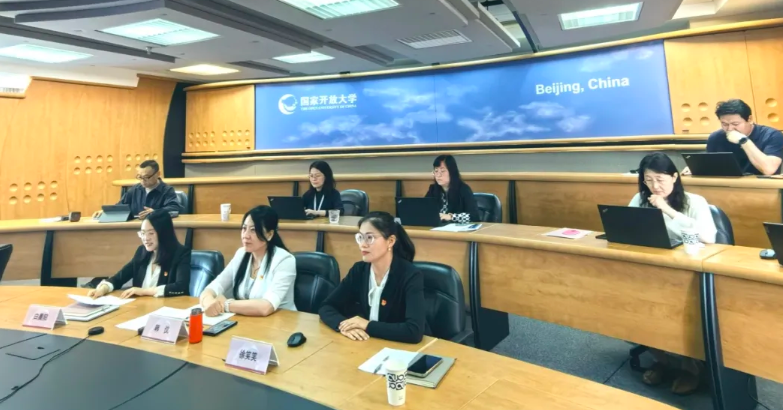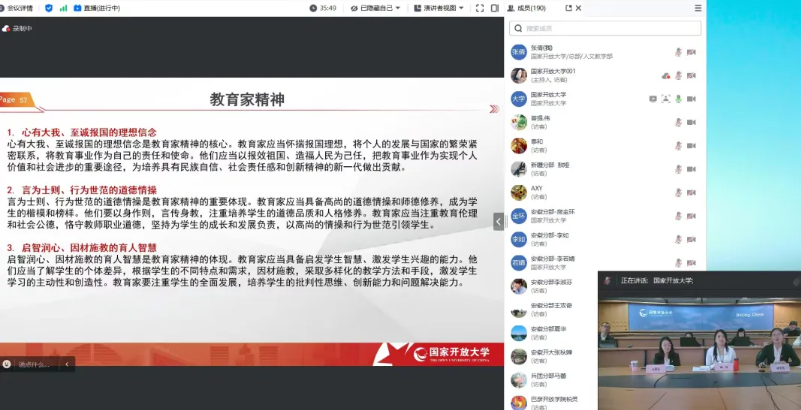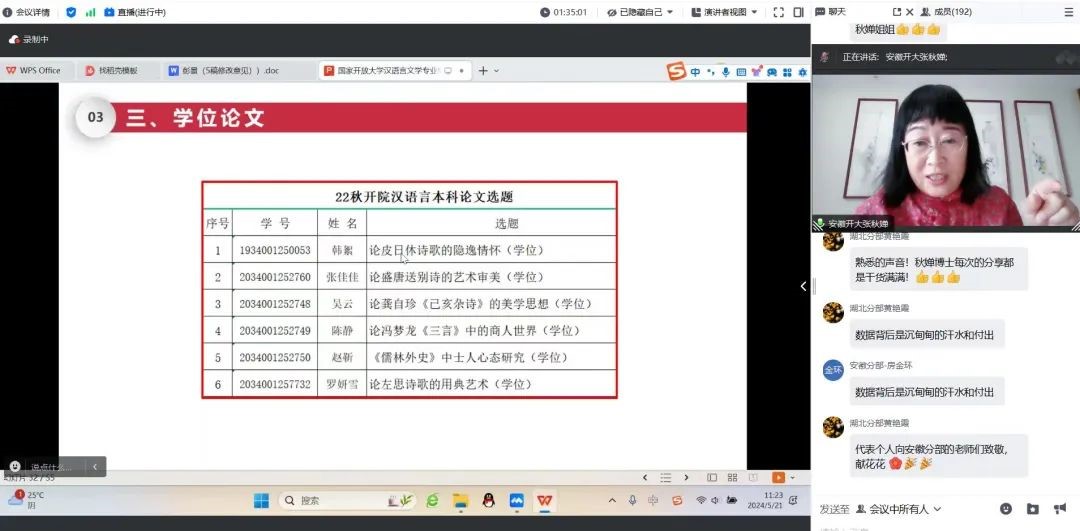 On 21 May 2024, the Open University of China (OUC) hosted a training session for moderators of the graduation dissertation defense in the Chinese Language and Literature programme at the School of Humanities.
On 21 May 2024, the Open University of China (OUC) hosted a training session for moderators of the graduation dissertation defense in the Chinese Language and Literature programme at the School of Humanities.
Attending the event were Han Yi, dean of the School of Humanities, all faculty members from the Department of Chinese Language and Literature, and over 230 teachers from 40 branches within the OUC system. The training was led by Bai Chenyang, the head of the Chinese Language and Literature programme (for junior college students pursuing an undergraduate degree) at the OUC headquarters.

Training Venue
The training was conducted both online and offline, with physical venues set up at the OUC’s Headquarters in Beijing, Sichuan Branch, and Anhui Branch. The focus was on enhancing the skills of defense moderators and discussing reforms to bolster the OUC's talent development in Chinese Language and Literature. The session was divided into three main topics.

Xu Xiaoxiao was making a presentation at the training venue.
Xu Xiaoxiao, deputy head of the Department of Chinese Language and Literature at the School of Humanities, kicked off the training with a presentation on the standards for defense moderators. She also detailed the university's policies, regulations, review processes, and standards for graduation (degree) dissertations in Chinese Language and Literature, and guided participants on how to navigate the teaching platform. Xu emphasised, "It is hoped that all participating teachers will approach their roles as defense moderators with the spirit of educators."

Wu Lingling was making a presentation.
Wu Lingling, the head of the Chinese Language and Literature programme at the Sichuan Branch, led the second topic. Drawing from her experience in excellence initiatives, she shared insights on the steps and methods for moderating and reviewing dissertation defenses. She highlighted that the OUC's dissertation defense process is fundamentally an open educational experience, spanning six months from submission, initial review, defense, revision to final review by the Sichuan Branch Degree Review and Approval Committee. The process includes personalised guidance and emphasises academic integrity to lay a solid foundation for students' future development. Wu stressed, "It is crucial to value students' degree application needs, maintain strict standards, and fully support their advancement in life."

Zhang Qiuchan was making a presentation.
The third training session was led by Zhang Qiuchan, a retired educator and former director of the Chinese Language Department at the Anhui Branch. The Anhui Branch has consistently ranked among the top in the nation for degree attainment over 14 successive semesters. Drawing from her extensive experience as a defense moderator, Zhang shared the Anhui Branch's strategies for enhancing degree acquisition rates, focusing on effective topic selection and rigorous dissertation defenses. "A well-chosen topic is the cornerstone of successful dissertation writing," she emphasised. To facilitate this, the Anhui Branch has developed a dedicated topic selection system to ensure students have ample time to prepare and submit their topics during breaks. Instructors actively engage students in field trips to libraries, practical training sites, and industrial settings to identify unique and high-quality research topics. In the realm of Chinese Language and Literature, faculty guide students through library visits, aligning student interests with scholarly inspiration to select relevant authors and works. They assist in borrowing pertinent materials, refining thesis points, and utilizing the CNKI database in the OUC Smart Library to access recent scholarly articles, enriching the research process and culminating in a well-rounded dissertation. Zhang Qiuchan advocates for a defense process that upholds strict academic standards while allowing for iterative improvements and revisions by the students.
Han Yi expressed her appreciation for the enthusiastic participation in the training and thanked the Sichuan and Anhui branches for their insightful contributions. She highlighted that the collaborative synergy within the system is a key competitive advantage for open universities. The foundation for excellence and quality enhancement lies in the standardization of educational practices, with the critical role played by the faculty in steering these efforts. Han Yi encouraged all attendees to anchor their efforts in educational reform, personal well-being, and joyful living, working together to promote the high-quality development of open education.
By School of Humanities